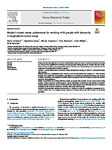Student nurses' career preferences for working with people with dementia: A longitudinal cohort study
| dc.contributor.author | Hebditch, M | |
| dc.contributor.author | Daley, S | |
| dc.contributor.author | Grosvenor, W | |
| dc.contributor.author | Sherlock, G | |
| dc.contributor.author | Wright, J | |
| dc.contributor.author | Banerjee, Sube | |
| dc.date.accessioned | 2022-08-23T16:17:21Z | |
| dc.date.issued | 2022-04 | |
| dc.identifier.issn | 1532-2793 | |
| dc.identifier.issn | 1532-2793 | |
| dc.identifier.other | 105303 | |
| dc.identifier.uri | http://hdl.handle.net/10026.1/19560 | |
| dc.description.abstract |
BACKGROUND: Internationally there are too few suitably skilled registered nurses to meet the demands for dementia care. Research has established low preferences in undergraduate nursing students for working with older people. However, there is limited research on preferences for dementia care. Understanding career preferences is one component of ensuring future workforce capacity. OBJECTIVE: To assess student nurses' preferences during undergraduate training in relation to working with people with dementia. METHODS: Data from a longitudinal survey collected at two UK universities were analysed (n = 488). Measures included career preferences, demographics, participation in a dementia educational intervention, and measures of attitude, knowledge, and empathy to dementia. Open text responses were also included to explore the students' reasons for their preferences. RESULTS: The preference for working with older people and people with dementia was low and decreased during training. A linear regression analysis supports a strong relationship of preferences with attitudes to dementia. Content analysis of students' reasons for their preferences found that perceived difficulty and lack of confidence contributes to the negative evaluation of working with people with dementia. CONCLUSION: Undergraduate nursing education needs to continue to review its contribution to preparing the dementia workforce and act to support positive attitudes to working with people with dementia across nursing specialties. | |
| dc.format.extent | 105303-105303 | |
| dc.format.medium | Print-Electronic | |
| dc.language | en | |
| dc.language.iso | eng | |
| dc.publisher | Elsevier | |
| dc.subject | Dementia | |
| dc.subject | Education | |
| dc.subject | Nursing students | |
| dc.subject | Career preferences | |
| dc.title | Student nurses' career preferences for working with people with dementia: A longitudinal cohort study | |
| dc.type | journal-article | |
| dc.type | Journal Article | |
| plymouth.author-url | https://www.webofscience.com/api/gateway?GWVersion=2&SrcApp=PARTNER_APP&SrcAuth=LinksAMR&KeyUT=WOS:000816912700019&DestLinkType=FullRecord&DestApp=ALL_WOS&UsrCustomerID=11bb513d99f797142bcfeffcc58ea008 | |
| plymouth.volume | 111 | |
| plymouth.publication-status | Published | |
| plymouth.journal | Nurse Education Today | |
| dc.identifier.doi | 10.1016/j.nedt.2022.105303 | |
| plymouth.organisational-group | /Plymouth | |
| plymouth.organisational-group | /Plymouth/Faculty of Health | |
| plymouth.organisational-group | /Plymouth/Faculty of Health/Peninsula Medical School | |
| plymouth.organisational-group | /Plymouth/Faculty of Health/Peninsula Medical School/PMS - Manual | |
| plymouth.organisational-group | /Plymouth/REF 2021 Researchers by UoA | |
| plymouth.organisational-group | /Plymouth/REF 2021 Researchers by UoA/UoA03 Allied Health Professions, Dentistry, Nursing and Pharmacy | |
| plymouth.organisational-group | /Plymouth/Users by role | |
| plymouth.organisational-group | /Plymouth/Users by role/Academics | |
| plymouth.organisational-group | /Plymouth/Users by role/Researchers in ResearchFish submission | |
| dc.publisher.place | Scotland | |
| dcterms.dateAccepted | 2022-02-15 | |
| dc.rights.embargodate | 2022-8-24 | |
| dc.identifier.eissn | 1532-2793 | |
| dc.rights.embargoperiod | Not known | |
| rioxxterms.versionofrecord | 10.1016/j.nedt.2022.105303 | |
| rioxxterms.licenseref.uri | http://www.rioxx.net/licenses/all-rights-reserved | |
| rioxxterms.licenseref.startdate | 2022-04 | |
| rioxxterms.type | Journal Article/Review |


